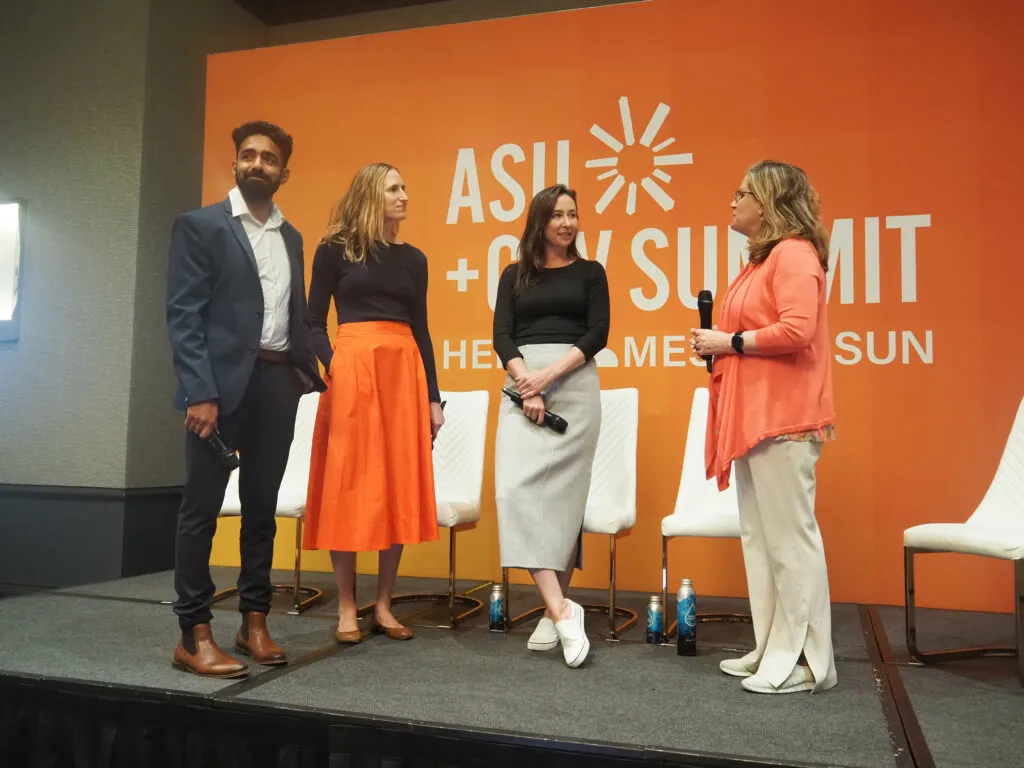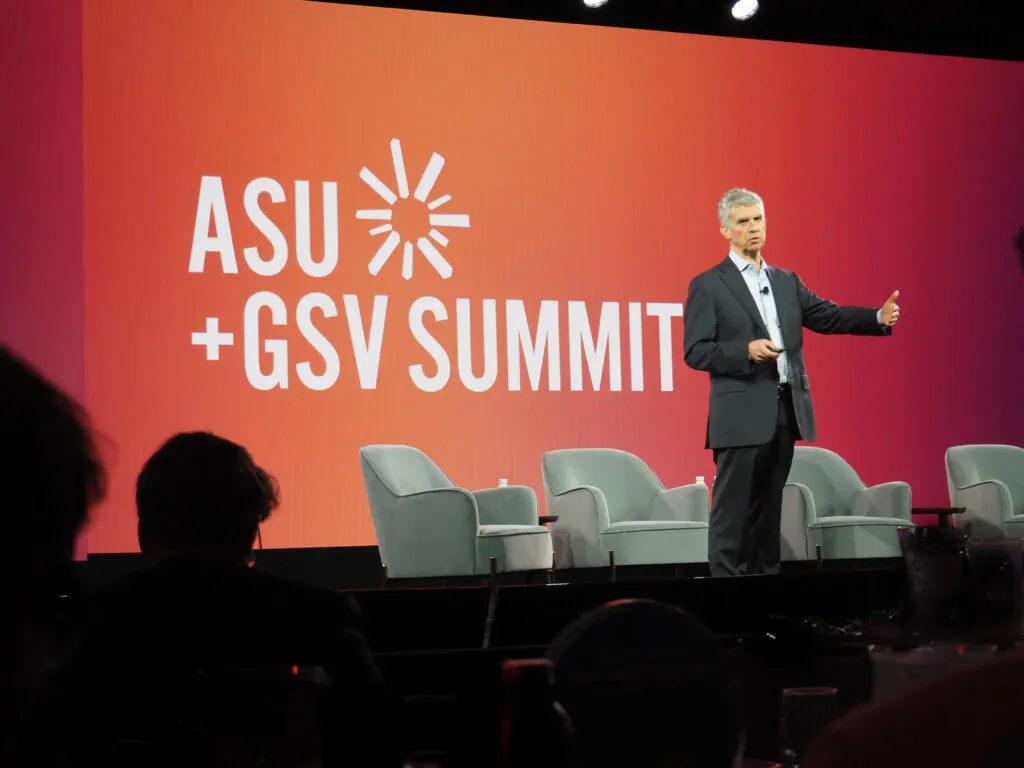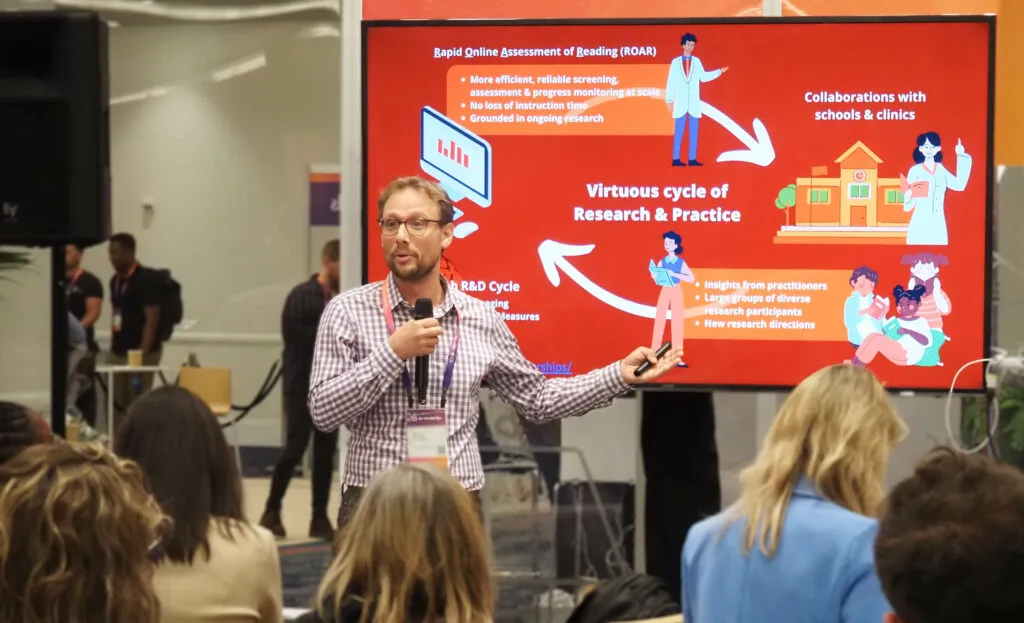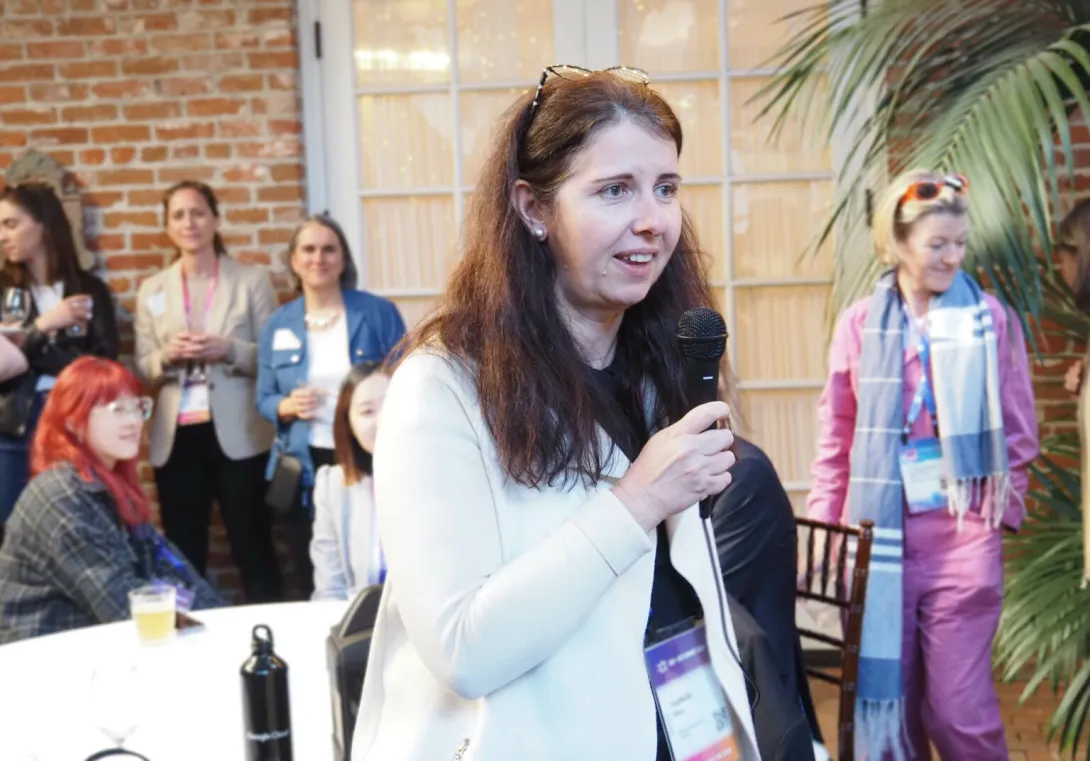
Speaking in the future tense: Stanford researchers help ASU+GSV grapple with artificial intelligence
For over a decade, the ASU+GSV Summit has brought together thousands of entrepreneurs, teachers, school district administrators, funders, and thought leaders to explore the latest innovations in education.
While there have always been trends and of-the-moment topics at ASU+GSV, never before has a single emerging technology infiltrated the conversation so thoroughly and felt relevant to such a wide range of education topics. This technology, of course, was artificial intelligence.
The summit organizers, recognizing a widespread need to communally grapple with AI and what it might mean for learners, educators, and classrooms, hosted a new two-day, free pre-show gathering focused entirely on AI called the AIR Show. Stanford learning specialists and faculty led multiple popular sessions for teachers at the event, including a workshop to design your own chatbot and an “ask me almost anything” session about large language models.
Even with two days of pre-show AI content, over a hundred sessions at the general summit were tagged as related to AI or machine learning. These ranged from the tactical (“The Future of Writing: Calibrating the Right Level of AI Intervention in The Writing Process”) to the existential (“Is AI Good for Education?”) and from the optimistic (“Will Generative AI be the World’s Greatest Learning Acceleration?”) to the realist (“Building with AI: Separating Real Innovation from Hype”).

Emma Brunskill (center left), associate professor of computer science and Stanford Accelerator for Learning faculty affiliate, and Bethanie Maples (center right), Graduate School of Education doctoral student, spoke on a panel about AI in education. Photo: Joleen Richards
Even the panels not ostensibly about AI ended up being about AI too, because AI could theoretically touch any area of learning – a transversal line across age groups and education settings. Panelists and attendees alike grappled with big questions: How will AI change my corner of the education sector? How do we make sure it’s safe? Is the technology even ready for this use? How do we make sure all the right stakeholders get a voice? Will AI diminish or exacerbate inequities in education?
Stanford scholars have been working on AI since long before ChatGPT was released in November 2022, and eight of the summit’s women leading the AI revolution in education were from Stanford, a testament to this longtime expertise. When it came to AI at this year’s summit, Stanford panelists led the charge of thinking through how it can be applied in education in evidence-based, thoughtful, meaningful ways.
Some key takeaways from Stanford speakers on a variety of topics, and their analysis of the impact of AI:
- The rise of AI is a chance to envision the learners of the future. Dan Schwartz, dean of Stanford Graduate School of Education (GSE) and faculty director of the Stanford Accelerator for Learning, spoke on StageX, the main stage of the summit, about how the rise of AI is a chance for us to collectively rethink how we want to teach and what we want students to learn. “I am concerned that AI may automate old ways of teaching suited to a previous era,” he said. While traditional schooling often separates teaching students to be efficient (accurate and fast) and innovative (creative and novel), AI has the potential to bring these two key aspects of learning together. If we build the tools intentionally, learners with AI at their fingertips will be able to develop “adaptive expertise” and thrive in a dynamic future. “Adaptive experts are able to balance a reliance on prior knowledge with the need and courage to develop and learn new ideas,” said Schwartz.

GSE Dean Dan Schwartz spoke on StageX, the main stage of the summit, at ASU+GSV about how the rise of AI is a chance for us to collectively rethink how we want to teach and what we want students to learn. (Photo: Joleen Richards)
- New generative AI tools are forcing us to recalibrate our classroom norms. When ChatGPT was released, “there was a moral panic about cheating,” said Victor Lee, associate professor and faculty lead for AI + Education at the Accelerator. However, his research with faculty affiliate Denise Pope indicated that the reasons students cheat have little to do with the tools available to them, and ChatGPT has not significantly changed rates of cheating in high schools. “What we see historically is that what we think of as responsible or ethical is in large part a function of what tools we have available,” said Lee, citing tools like calculators, audio recorders, spelling and grammar checkers, and Wikipedia that were once considered inappropriate in the classroom but are now widely used. “With AI, we’re in the midst of recalibrating norms about what we think of as acceptable,” he said. He urged teachers and districts to consider: “What are the core competencies to enable smart use of a given tool? What do we want people to be able to do when the tool is not available? We want people to be able to use good judgment about when to use or not to use the tool.”
- Technology can help us understand and reduce illiteracy at scale. Sparked by pandemic-era needs, the Rapid Online Assessment of Reading (ROAR) is an online, automated, gamified tool to assess student reading ability. Associate Professor Jason Yeatman, faculty affiliate of the Accelerator, shared how his lab developed and finessed the ROAR by trying out different tweaks to the tool and testing it with both real students and AI simulations. “Our tool is grounded in cognitive neuroscience and rigorously validated in the lab and in schools,” he said. “We’ve now gotten it to a point of better reliability than the gold standards against which we developed it. This enables us to do inclusive research because we can test kids’ reading at scale, not just children in the area around Stanford.”

Jason Yeatman, faculty affiliate of the Accelerator shared the work of Rapid Online Assessment of Reading (ROAR) at ASU+GSV. (Photo: Joleen Richards)
- Tutoring is an effective tool, but we can’t do away with human tutors. Susanna Loeb, faculty director of the SCALE initiative and founding director of Stanford’s National Student Support Accelerator, shared evidence about what makes tutoring effective and how AI might play a supporting role. She cautioned against the hype around AI tutors. “The power of tutoring is that it can inspire, motivate, and engage students to where they are more likely to want to be in school and see themselves as students,” she said. While there is evidence that virtual tutoring by a human tutor is effective, AI tutors only show effectiveness for the most motivated and engaged students. Instead, she said that AI could be used to transform how schools work and move toward more individualized attention to each student, while still prioritizing the important role of adults.
- When used appropriately, AI can support workforce development and economic mobility. Candace Thille, faculty director of the Adult and Workforce Learning initiative at the Accelerator, sees potential for AI to support personalized learning journeys for workers trying to develop new skills. With mass amounts of data and models to process it available, “we’re not building learning paths anymore, we’re building dynamic recommendations, always keeping the learner’s agency at the center,” she said. At the same time, she advocated for transparency in data collection from workers and the models built using this data. In particular, Thille emphasized that the data should be used only to support worker learning and not shared with employers.
- The future of edtech is bright. GSE students and alumni alike enjoyed the summit to learn, network, and develop their ideas. Notable speakers included doctoral student Bethanie Maples, founder and CEO of Atypical AI, and Alex Stolyarik, MS ‘23, co-founder of EcoSystemOne.
Additional Stanford sessions included:
- Assessing Mind and Machine: Measuring What Matters in AI Learning (Emma Brunskill)
- Will Generative AI be the World’s Greatest Learning Acceleration? (Isabelle Hau)
- New Dawn for Neurodiversity: EdTech's Transformative Role (Bruce McCandliss)
- The Challenges of University Leadership in 2024 (Mitchell Stevens)

Isabelle Hau, executive director of the Stanford Accelerator for Learning, welcomes guests to a cocktail hour co-hosted with Reach Capital. (Photo: Joleen Richards)
Faculty mentioned in this article: Dan Schwartz , Denise Pope , Victor R. Lee , Jason Yeatman , Bruce McCandliss , Mitchell L. Stevens , Candace Thille , Susanna Loeb



